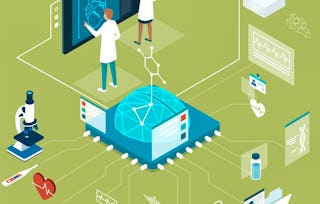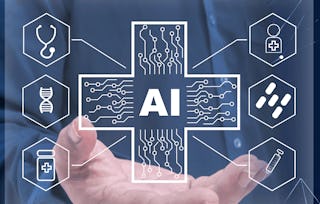Examines data mining perspectives and methods in a healthcare context. Introduces the theoretical foundations for major data mining methods and studies how to select and use the appropriate data mining method and the major advantages for each. Students are exposed to contemporary data mining software applications and basic programming skills. Focuses on solving real-world problems, which require data cleaning, data transformation, and data modeling.

Machine Learning in Healthcare: Fundamentals & Applications

Machine Learning in Healthcare: Fundamentals & Applications


Instructors: Sonya Makhni
1,617 already enrolled
Included with
10 reviews
Skills you'll gain
Details to know

Add to your LinkedIn profile
23 assignments
See how employees at top companies are mastering in-demand skills

There are 4 modules in this course
In this module, we’ll start demystifying the terminology. We’ll begin by exploring the differences between AI, machine learning and deep learning. You’ll also gain hands-on experience in planning your own AI algorithm development, and learn what goes into preparing and constructing datasets for research questions.
What's included
8 videos7 readings5 assignments1 peer review2 discussion prompts
In this module, we’ll take a deep dive into several sophisticated AI modeling techniques, including random forest modeling, gradient boosting, clustering and neural networks.
What's included
6 videos8 readings7 assignments2 discussion prompts
In this module, you’ll dive deeper into the nitty gritty of how AI algorithms are trained and validated, and examine how they compare to clinicians in the field.
What's included
6 videos5 readings7 assignments2 discussion prompts
In this module, we’ll explore why so many potentially useful algorithms are not being implemented by healthcare providers. That critique will explore the black box dilemma, and the challenges involved in developing accurate and equitable data sets. That means examining the many ways in which algorithms can discriminate against various marginalized segments of the population.
What's included
7 videos6 readings4 assignments2 discussion prompts
Offered by
Explore more from Research
 Status: Preview
Status: PreviewNortheastern University
 Status: Preview
Status: PreviewCleveland Clinic
 Status: Free Trial
Status: Free TrialStanford University
 Status: Free Trial
Status: Free Trial
Why people choose Coursera for their career

Felipe M.

Jennifer J.

Larry W.

Chaitanya A.
Learner reviews
- 5 stars
70%
- 4 stars
30%
- 3 stars
0%
- 2 stars
0%
- 1 star
0%
Showing 3 of 10
Reviewed on Feb 5, 2025
It was fine. The only complaint about the food is the cookie needed to be heated up and the lines were too long.

Open new doors with Coursera Plus
Unlimited access to 10,000+ world-class courses, hands-on projects, and job-ready certificate programs - all included in your subscription
Advance your career with an online degree
Earn a degree from world-class universities - 100% online
Join over 3,400 global companies that choose Coursera for Business
Upskill your employees to excel in the digital economy
Frequently asked questions
To access the course materials, assignments and to earn a Certificate, you will need to purchase the Certificate experience when you enroll in a course. You can try a Free Trial instead, or apply for Financial Aid. The course may offer 'Full Course, No Certificate' instead. This option lets you see all course materials, submit required assessments, and get a final grade. This also means that you will not be able to purchase a Certificate experience.
When you purchase a Certificate you get access to all course materials, including graded assignments. Upon completing the course, your electronic Certificate will be added to your Accomplishments page - from there, you can print your Certificate or add it to your LinkedIn profile.
Yes. In select learning programs, you can apply for financial aid or a scholarship if you can’t afford the enrollment fee. If fin aid or scholarship is available for your learning program selection, you’ll find a link to apply on the description page.
More questions
Financial aid available,

